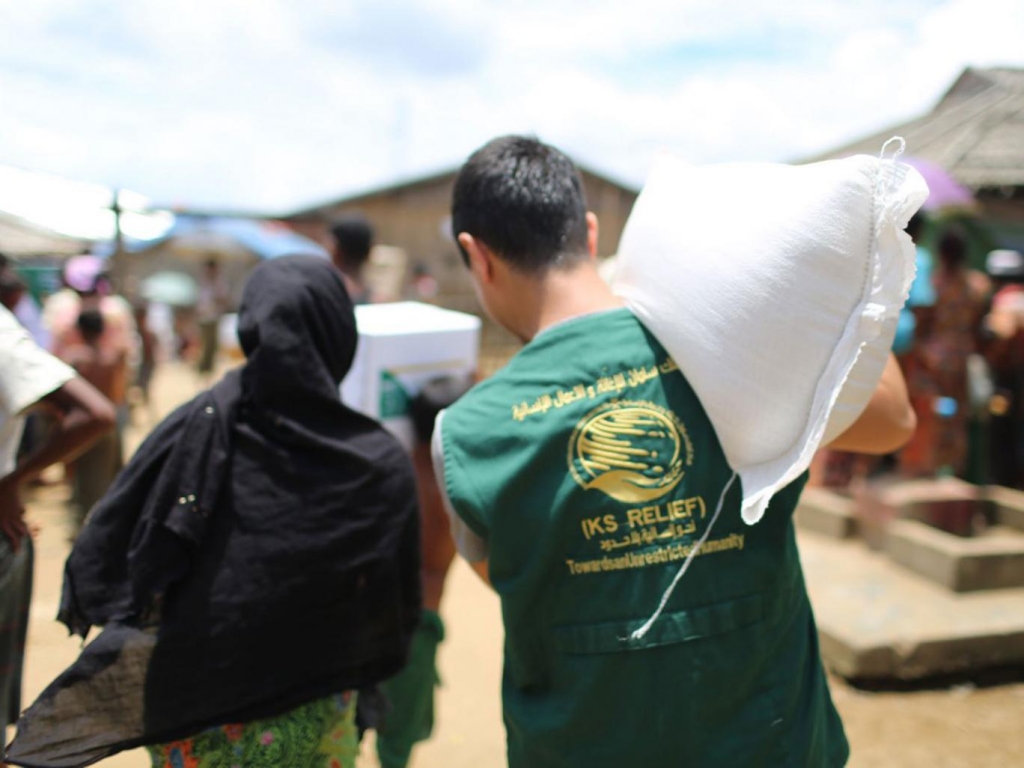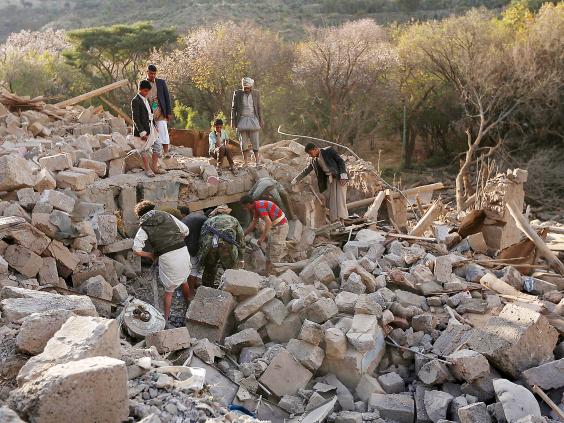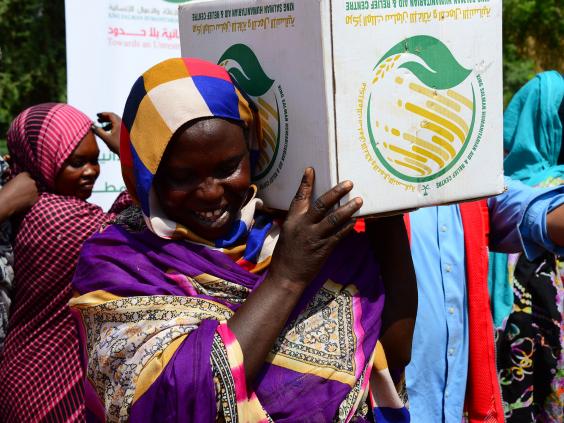Exclusive: KS Relief insists it’s ‘here to help’ but UN says only solution to humanitarian crisis is ending the conflict
Saudi Arabia has “no intention whatsoever to bombard or kill civilians” in Yemen, according to the head of the country’s foreign aid agency.
Dr Abdullah al-Rabeeah, supervisor general of the King Salman Humanitarian Aid and Relief Centre (KS Relief) says he sees no conflict between bombing a country while claiming to be its biggest aid donor.
The United Nations and humanitarian groups have accused Saudi Arabia of possible war crimes in its air campaign supporting President Abdrabbuh Mansour Hadi’s government.
The Saudi-led coalition’s air strikes are responsible for more than half of 13,000 civilian casualties, according to UN figures, as well as worsening hunger crisis and the world’s worst cholera outbreak.
But Dr al-Rabeeah insists Saudi Arabia is the “number one donor for aid and development in Yemen”, adding: “We’re here to help.”
More than 1bn (£202.4m) Saudi riyals have already been allocated for KS Relief’s operations in Yemen, where it is distributing food and humanitarian aid.
Asked whether he sees any tension between the efforts and Saudi Arabia’s ongoing bombing campaign, Dr al-Rabeeah said he did not.
“Saudi Arabia is not the only country in a conflict and providing aid,” he told The Independent, pointing to Western programmes in Iraq, Syria and Afghanistan.
“When there is a conflict there will be mistakes, but we account for our mistakes and apologise for them, and try to compensate those who have been hurt.
“But there is no intention whatsoever to bombard or kill civilians.”
Dr al-Rabeeah claimed the aim of the Saudi-led coalition is to “regain the will of the Yemeni people”, which he said had been “taken by force” by Houthi rebels, jihadi groups and troops loyal to the former President.
He described Yemen as the “bulk” of KS Relief’s work since it was founded by King Salman bin Abdulaziz al-Saud in 2015, as well as Syria.
It also runs projects in Iraq, Djibouti, Somalia and provides aid to more than 37 countries on four continents.
Dr al-Rabeeah said the organisation had been “directed from day one to work according to the principles of international humanitarian law”.
“KS Relief is not driven by any motive related to race, colour, religion or any political or military motive,” he added. “We work only for the sake of humanity.”
But the organisation’s own website describes its mission as ensuring the provision of foreign aid in line with unspecified “national interests”.
In Yemen, those interests sit against the Iranian-backed Houthis, while in Syria they lie behind rebels including Islamist groups seeking to overthrow President Bashar al-Assad.
In both countries, there have been allegations of aid by KS Relief being distributed either exclusively in areas controlled by pro-Saudi forces, or handed over to humanitarian groups with conditions attached.
Dr al-Rabeeah denied the accusations, saying it was working through partner NGOs in Houthi strongholds in Yemen, including Sana’a and Hajjah.
“We work in zones we can access,” he added. “We want to help the poor communities and the areas of highest need as prioritised by the UN needs assessment.
“The top of our partners in both Syria and Yemen are UN organisations and international NGOs.
“They are unbiased and impartial and we respect that and abide by that.”
Dr al-Rabeeah, who was previously the Saudi health minister and is a surgeon specialising in separating conjoined twins, said his medical background had left him with an ingrained “respect for life”, adding: “We certainly hope there will be a peaceful solution for Syria and Yemen in line with UN resolutions and agreements by the international community.”
He acknowledged that some were uneasy about Saudi Arabia’s resurgence on the international aid scene two years ago, adding: “It took time for partners in the international community to know us but I’m confident that centre has now managed to develop very strong links.”
Even within international development circles, few have heard of KS Relief, but that may soon change as it mounts a PR offensive seeing it hire a prominent British communications firm and sponsor a recent aid conference in London, giving out souvenirs including branded pens and coffee cups.
Dr al-Rabeeah said KS Relief’s work in Yemen had “proven… that we are truly impartial”, and believes trust in the organisation is building globally.
The UN certainly has no qualms using funding from the organisation to fight the cholera epidemic that has affected more than 240,000 people in the country, many of them children.
Saudi Arabia has pledged $66.7m (£7.16) from KS Relief to Unicef and the World Health Organisation for their response, but while thanking the government for its donation the UN stressed that the worsening humanitarian crisis was “man-made”.
Russell Geekie, a spokesperson for the UN Office for the Coordination of Humanitarian Affairs, told The Independent: “More than anything, we need to see sustained political commitment to resolution of conflict, which is driving the crises in Yemen, Syria and in some many other places throughout the world today… the only lasting solution to horrors like cholera and famine in Yemen is to end the conflict.”
Britain is among the countries supporting Riyadh’s intervention in Yemen, training Saudi pilots to “improve their targeting processes” and selling arms including cluster munitions to be used in air strikes.
The UN’s humanitarian coordinator in Yemen, Jamie McGoldrick, warned that civilians and infrastructure was continuing to be targeted in possible violations of international law.
Recent attacks have hit a market near the Saudi border, killing six children, and seen more than 40 Somali refugees killed while attempting to flee the war-torn country on a boat.
“Wars have laws and I implore that all parties to the conflict uphold their responsibilities to comply with international humanitarian and human rights laws,” Mr McGoldrick said.
“I urge those influencing and arming the parties to use their position to end the conflict and to stop fuelling the violence.”
The conflict started in March 2015 after an opposition offensive drove the government out of the capital Sana’a, sparking an intervention by Saudi Arabia and its allies to support the internationally recognised government.
Critics have accused Riyadh, along with Western allies, of hypocrisy in supporting rebels in one current conflict and the “legitimate government” in the other.
Peter Salisbury, a senior research fellow in the Middle East and North Africa programme at Chatham House, said Britain was the principal sponsor of a UN Security Council resolution used by Saudi Arabia to justify its intervention in Yemen.
“Arguably the UK has also given political coverage to the Saudis by preventing various resolutions and investigations from happening.”
Dr al-Rabeeah described Saudi Arabia’s relationship with the UK as “very strong”, describing KS Relief as a “partner from day one” of the Department for International Development.
“They have helped us build capacity and make sure we work in line with the international level,” he added.
The Government department is understood to be expanding collaboration with King Salman’s foundation but not working jointly on any projects.
Since the bombing of Yemen began, the UK has licensed £3.3bn worth of arms to the Saudi regime, including for aircraft, helicopter, drones and missiles, according to the Campaign Against the Arms Trade (CAAT).
The group is waging a legal battle to prevent the sales with a judicial review in the High Court.
Representative Andrew Smith accused the British Government and others of being “totally complicit” in the destruction and humanitarian catastrophe in Yemen.
He told The Independent: “Any aid that is helping people is to be welcomed, but the best thing that the Saudi regime can do for the people of Yemen is to stop the brutal bombing campaign than has killed thousands and brought millions to the edge of starvation.”



